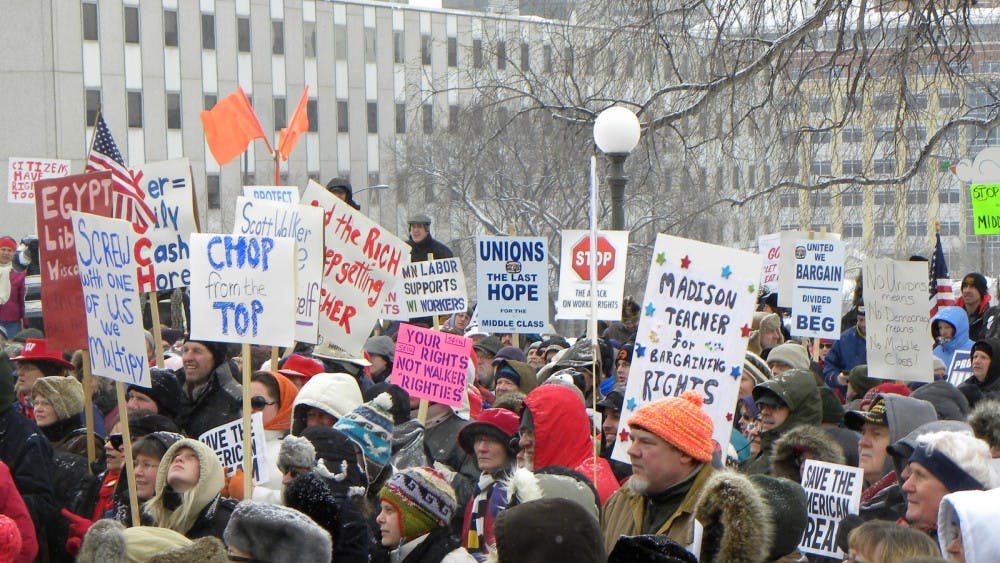Virginia proudly boasts the claim of number one in the country for business. When talking to my former state representative, Democrat Dave Marsden, during the June primary election I brought up my concern about right-to-work-for-less laws, or anti-union laws in Virginia. He reassured me that he wanted to help workers but also make sure Virginia was good for businesses. In reality though, “good for business” means good for bosses, and in Virginia it means workers suffer. An Oxfam report found Virginia to be the worst state in the country for workers. This is appalling and also highlights the desperate need for the revival of labor unions in Virginia and the country.
Unions are organizations that collect the membership of employees into a single body. The goal of doing so is that workers have a more credible threat to walk off the job or strike when it is every worker threatening it versus just a few. Negotiating pay is more powerful when it is 100 people rather than 1 person, this is known as collective bargaining. But unions also serve as a way to make demands beyond just pay. Working conditions, healthcare, hours, retirement benefits and more are all codified in contracts when workers collectively force bosses to negotiate. This is why corporations like Amazon furiously resist unionizing efforts, and even ostensibly liberal organizations like NextGen America engage in union-busting. It’s as simple as a conflict between workers and bosses, if workers get more pay or more benefits then the boss gets less profit to bathe in.
Those aligned with corporate interests have often implemented “right-to-work” laws as a way of discouraging union membership. To dispel the myth of “right-to-work” laws it’s important to understand that these laws only exist to hurt working-class people and make capitalists richer. But “right-to-work” also doesn’t mean that labor unions are outlawed. Rather it means that workers can essentially opt out of the union in their workplace, no longer paying dues to the union and forgoing collective bargaining for state employees. When workers can’t strike, or act as a unified group, the boss is able to weaken their stake in the profit of the company. In Virginia, this means employees make lower wages, are less protected and have fewer benefits. Nationally, 27 states have right-to-work-for-less laws which have translated into stagnated wages and soaring inequality.
Two current labor struggles illustrate the importance of unions around the country. First is the United Auto Workers strike against General Motors. 49,000 workers went out on strike against increases in healthcare costs and paltry raises. Since 2007, GM has increasingly pushed for two-tiered contracts, which exclude many employees from benefits. GM is a massively profitable company now, making 11 billion dollars in profit last year. Its workers, however, are stuck with higher healthcare costs forced on them by GM and nowhere near high enough raises. Right before our eyes, we are seeing the power of the working class to halt production and demand better conditions for themselves and their communities. Strikes like the UAW one also incorporate demands to restart production in idle factories, giving a life line to communities destroyed by deindustrialization.
The second important struggle happening right now is with Coalition of Kaiser Permanente Unions, which threatened to bring 80,000 workers out on strike, the largest labor action in over 20 years. Just the threat of a strike reportedly led to an agreement of higher wages and better conditions for the workers. The lesson of these two examples is simple — when there are unions, the power of workers to demand better conditions for themselves and their community is much stronger than without a union.
In Virginia, the unfortunate lack of unions hurts us all. Charlottesville specifically has the highest level of income inequality in the Commonwealth and the University plays a key role in local inequality as the largest employer in the city. The large disparity of how much academic employees are paid and how much low-wage employees are paid sets a center-of-gravity for the problems of income inequality in the area. This is the same sort of tiered system UAW workers are trying to fight against with their strike.
The increase of wages to 15 dollars an hour only counts for direct employees, not contracted employees. In the academic section of University employees, the difference in compensation of adjuncts and professors creates precarious employment for more faculty. While there was once a staff union that could deal with these issues, now individuals are left to fend for themselves. The issues of wages and employment are never settled without a collective organization to negotiate a contract. Inflation and cost of living can go up with no guarantee that wages will.
The path forward for working-class residents of Virginia and the United States is through rebuilding the labor movement, a challenging but possible task. Presidential candidate Sen. Bernie Sanders (I-Vt.) has proved himself the most committed to this task, rallying with UAW workers on the picket line and with Chicago Teachers Union members ahead of a potential strike. Additionally his plan includes provisions to double union membership, institute sectoral bargaining, repeal right-to-work laws and give all workers the right to strike. This sort of transformational national vision for labor unions is just what the country needs and just what Virginia needs.
Jake Wartel is an Opinion Columnist for The Cavalier Daily. He can be reached at opinion@cavalierdaily.com.







